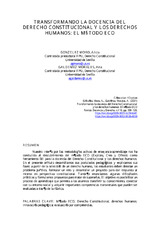Transformando la docencia del derecho constitucional y los derechos humanos: el método ECO
changing the way of teaching constitutional law and human rights: the ECO method
Autor
González Moro, Alicia
Galdámez Morales, Ana
Editor
UCOPressFecha
2021Materia
Método ECODerecho Constitucional
Derechos humanos
Innovación pedagógica
Evaluación de competencias
ECO method
Constitutional Law
Human rights
Educational innovation
Competency-based assessment
METS:
Mostrar el registro METSPREMIS:
Mostrar el registro PREMISMetadatos
Mostrar el registro completo del ítemResumen
Nuestro interés por las metodologías activas de enseñanza-aprendizaje nos ha
conducido al descubrimiento del método ECO (Explora, Crea y Ofrece) como
herramienta útil para la docencia del Derecho Constitucional y los derechos humanos.
En el presente artículo desarrollamos sus postulados pedagógicos y explicamos sus
fases: a partir de la selección de un derecho humano, los estudiantes deben detectar un
problema jurídico, formular un reto y desarrollar un proyecto para dar respuesta al
mismo en perspectiva constitucional. También enunciamos algunas dificultades
prácticas y formulamos propuestas para tratar de superarlas. El objetivo es posibilitar un
proceso de aprendizaje que permita a los alumnos transferir su conocimiento, conectar
con su entorno social y adquirir importantes competencias transversales que pueden ser
evaluadas a través de la rúbrica Our interest in active teaching-learning methodologies led us to discover the
ECO method (Explore, Create and Offer) as a useful tool for teaching Constitutional
Law and human rights. In this article we explain its pedagogical postulates and its
phases: starting from the selection of a specific human right, students must identify a
legal problem, formulate a challenge and develop a project to solve it. It is also pointed
out some practical difficulties and formulate proposals to try to overcome them. The
aim is to achieve a learning process where students transfer their knowledge, connect
with their social environment and acquire important transversal competences that can be
assessed through the rubric

